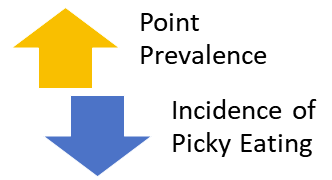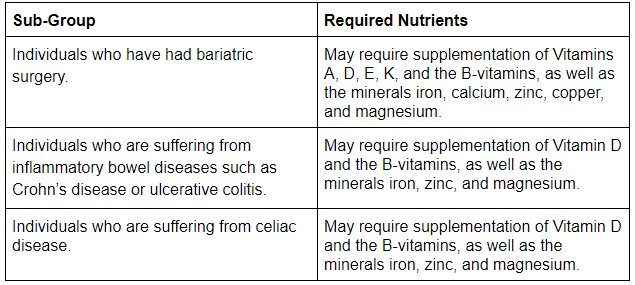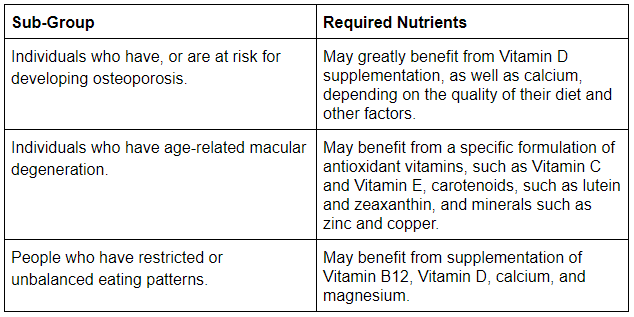In our modern world, people are becoming more conscious of the food that they eat and where it comes from.
Unfortunately, for a variety of reasons, many people may be unable to obtain organically grown food.
This may mean that they, along with certain other groups of people, are not getting sufficient amounts of essential nutrients through their diets alone.
Multivitamin supplements may help these people fill in their nutritional gaps and deficiencies.
In this article, we’ll be discussing the necessity of multivitamins in making sure that you have healthy levels of essential vitamins and minerals.
Let’s look at:
How Multivitamin Supplements Compare to a Well-Balanced Diet?
There was a recently published clinical guideline that provides information about the appropriate use of vitamin and mineral supplementation to patients, as well as generally healthy individuals. It was authored by Dr. JoAnn E. Manson and Shari S. Bassuk, ScD, who work in the Division of Preventive Medicine at the Brigham and Women’s Hospital at Harvard Medical School.
According to them, our best source of vitamins and minerals that our body needs to properly function comes from a well-balanced diet. The human body prefers naturally occurring sources of vitamins and minerals because they are better absorbed.
So then, where do multivitamin supplements factor into this?
Dietary supplements are called “supplements” for a reason. They are only ever meant to be an ADDITIONAL source of nutrients, not the MAIN source.
Researchers, clinicians, dieticians, and nutritionists all agree that there is no substitute for a well-balanced diet.
According to nutrition professors and researchers Alice H. Lictenstein, D.Sc., and Dr. Robert M. Russell, who are based at the Jean Mayer USDA Human Nutrition Research Center on Aging at Tufts University, the data leans more towards a link between positive health outcomes and dietary patterns, which consist of the types and amounts of foods that you consume.
Furthermore:
Penny Kris-Etherton, Ph.D., R.D., and Distinguished Professor of Nutrition at the Pennsylvania State University’s College of Health and Human Development, has said that nutritionists recommend food first because they provide various vitamins, minerals, and dietary factors that cannot be found in a dietary supplement.
These factors include bioactive compounds and dietary fiber.
Additionally, there are some supplements that do not allow for full vitamin absorption.
Why Whole Foods May Not Be Enough Anymore?
If that’s the case, then why do so many healthy people use supplements?
Although whole, natural foods possess dietary fiber and many bioactive compounds and dietary factors that cannot be found in a supplement, it is a matter of fact that, over the past century, the nutrient value of many foods has plummeted.
To be more specific:
The introduction of mechanized farming, ammonium nitrate, the usage of pesticides, herbicides, and fungicides has destroyed many of the beneficial microorganisms in soil that control the nutrient uptake of crops that provides you with essential nutrients.
While crop yield, size, and growth rate have increased, the soil quality and nutrient quality of the food both have decreased.
The nutrients that have been affected include:
- Phosphorus
- Selenium
- Copper
- Magnesium
- Cobalt
- Calcium
- Zinc
- Iron
There was one breakthrough research study done at the Department of Chemistry and Biochemistry at the University of Texas at Austin that was published in the Journal of the American College of Nutrition. The researchers in this study found that, in the U.S., over the 50-year period between 1950 and 1999, the levels of phosphorus, calcium, iron, protein, Vitamin B2, and Vitamin C in 43 different fruits and vegetables have been steadily decreasing.
The researchers of this study blame the decline in nutritional value of foods on the agricultural focus on the physical traits of crops rather than their nutrition. Although the levels of magnesium, zinc, Vitamin B6, and Vitamin E ware not studied in 1950, the researchers of this study believe that the nutritional value of these essential nutrients in food has also decreased.
These researchers recommend that you look for food that is grown organically through methods such as regenerative or Biodynamic agricultural practices, which focus on soil quality, and do not use pesticides, fertilizers, and other chemicals that destroy microorganisms in the soil.
Earlier, we mentioned that many people may be unable to obtain organically grown food. The primary reason that most people do not buy organic food is because of their higher cost.
According to the Organic Farming Research Foundation, the cost of organic food is higher than the cost of food grown through conventional agricultural practices because of the added cost of sustainable practices. The price tag of organically grown food more accurately reflects its true cost of growing.
How Do Multivitamins Fit In?
There are many reasons why people have started to look to supplements as a way to fill their nutritional gaps. One main reason is the decreased nutrient quality of food in the past few generations.
Another primary reason is poor dietary patterns.
According to Elizabeth M. Ward, MS, RD, it was estimated that about 117 million adults in the U.S., which makes up one-half of the adult population, have at least one preventable chronic disease, most of which correlate with poor dietary patterns and an inadequate amount of physical activity.
These diseases and medical conditions include, but are not limited to:
- Hypertension
- Type 2-diabetes
- Cardiovascular disease
The 2015-2020 Dietary Guidelines for Americans, also known as the 2015 DGA, is a joint project of the U.S. Department of Health and Human Services and the USDA that is designed to help American adults and children 2 years of age and older make healthy eating choices.
According to the 2015 DGA, based on the metric of the Estimated Average Requirement (EAR), Americans that are 2 years of age and older are deficient in the essential nutrients of potassium, dietary fiber, choline, magnesium, calcium, Vitamin A, Vitamin D, Vitamin C, and Vitamin E.
Additionally, it was found that adolescent females and women aged 19 to 50 are deficient in iron. This is due to poor dietary patterns which have low intakes of the food groups that contain these nutrients.
For reference:
Food groups that contain these nutrients include: fruits, vegetables, whole grains, and dairy.
Deficiencies in calcium, potassium, dietary fiber, and Vitamin D are a matter of public health concern for the general population because low intake of these nutrients correlate with various health conditions.
Deficiency in iron is a matter of public health concern for young children, women capable of becoming pregnant, and women who are pregnant. Although the 2015 DGA emphasizes that making small shifts in food choices will help fill nutritional gaps, the research suggests that consumers have made few improvements in their food choices in the past couple of decades.
Here’s where multivitamins come into the picture:
According to Howard Sesso, ScD, MPH (Master of Public Health), associate professor of epidemiology at the Harvard T.H. Chan School of Public Health, the usage of a daily multivitamin supplements likely plays a role in helping to fill nutritional gaps, especially when the issue of insufficient or deficiency of essential nutrients is a cause for concern.
He has also stated that there have not been any risks identified with using a common multivitamin supplement broadly focused on essential vitamins and minerals. When it comes to the effectiveness of multivitamin supplement usage in addressing nutritional gaps, it has been found that nutritional gaps or deficiencies are less common among multivitamin supplement users.
That is because of the nutrients the multivitamins provide, and also possibly because those who use multivitamin supplements have a tendency to be more active, better educated, and are less likely to be smokers. These are factors that are usually correlated with having a more well-balanced diet and an overall healthier lifestyle.
There was a recent study from 2017 that investigated the impact of frequency of multivitamin supplements or multivitamin / multimineral supplements intake on nutritional adequacy and nutritional gaps or deficiencies in U.S. adults. The study was based on data obtained from The National Health and Nutrition Examination Surveys 2009 to 2012.
The results?
This study found that, among adults in the U.S., the usage of multivitamin supplements or multivitamin / multimineral supplements is positively correlated with decreased micronutrient insufficiencies and a lower risk of nutritional gaps or deficiencies.
To be clear:
Multivitamin supplements or Multivitamin / Multimineral supplements are defined as having providing at least 100% of the Recommended Dietary Allowance, also known as the RDA, or Adequate Intake, also known as AI, for at least 9 vitamins and/or minerals In regards to deficiencies in Vitamin B6, Vitamin B12, and Vitamin D, the use of a multivitamin/multimineral supplement at any frequency was found to have a positive correlation with a significantly reduced risk (58%-69%) of being at or below deficiency levels.
Frequencies include up to 10 days a month, up to 20 days a month, at least 21 days in a month, or anywhere from 1 to 30 days in a month.
More specifically, the use of multivitamin supplements or multivitamin / multimineral supplements for at least 21 days in a month was positively correlated with a 58%-76% decreased risk of being at or below deficiency levels for these vitamins.
How to Use Multivitamin Supplements in Healthy Individuals by Life Stage
There are some people who consume a balanced diet of 100% organic and biodynamically food who are unlikely to benefit from multivitamin supplements.
However, there are billions of individuals who may benefit from it, especially depending on their stage of life. In addition, there are also high-risk groups of people who may benefit greatly from multivitamin supplements to address their nutritional gaps and deficiencies. There are typically three life stages at which generally healthy individuals may greatly benefit from supplementation: infants and children, pregnancy, and midlife and older adults.
Infants and Children
There was a recent longitudinal study that investigated the incidence, point prevalence, persistence, and characteristics of picky eating of 120 children from ages 2 to 11.
For reference:
Point prevalence refers to the percentage of people in the population who have a disease or condition within a specific time period. In this study, it was found that at any given age, between 13% and 22% of the children studied were reported as picky eaters.
This suggested that picky eating was chronic in nature, and that 40% of the children studied have been picky eaters for at least 2 years. Those who were picky eaters for longer were different from those who were picky eaters for a shorter period of time – the more chronic picky eaters had stronger likes and dislikes of certain foods, and did not accept new foods.
The parents of these picky eaters also reported that their children ate a limited variety of foods. Naturally, a prolonged period of picky eating could lead to deficiencies in essential nutrients over time. This helps justify the need for supplementation.
Parents should be careful NOT to use supplements that contain excessively high levels of Vitamin A, Vitamin B9, also known as folate or folic acid, and zinc, which may push the intakes of those nutrients over the Tolerable Upper Intake Level. The levels of those nutrients were already more than sufficient in a significant number of toddlers and preschoolers in the study.
Pregnancy
For women who expect to become pregnant or who are in their first trimester, they should be recommended to receive folic acid, or Vitamin B9, supplementation in the amount of 0.4-0.8 mg daily to prevent neural tube defects in the developing child. Folic acid is one of few micronutrients that is more bioavailable in a synthetic form as included in supplements or fortified foods than its naturally occurring dietary form of folate.
Additionally, women who are pregnant may benefit from multivitamin supplements because of their inclusion of folic acid, Vitamin D, and various other micronutrients that are essential during pregnancy. It is also highly recommended that pregnant women eat an iron-rich diet.
Midlife and Older Adults
Adults aged 50 years and older may not be able to efficiently absorb naturally occurring Vitamin B12 because of their decreased capacity to extract Vitamin B12 bound to food proteins. They are recommended to meet the RDA of 2.4 mcg daily using Vitamin B12 that is found in fortified foods or supplements. Adults up to the age of 70 years are currently recommended to receive 600 IU daily of Vitamin D to maintain their bone health and 800 IU daily for those older than the age of 70 years.
There are some professional organizations that have recommended daily Vitamin D supplementation in the amounts of 1,000-2,000 IU, but randomized large-scale clinical trials are still ongoing. Men aged 51 to 70 years currently have an RDA of 1,000 mg of calcium daily. Women in the same age range and all adults aged older than 70 years currently have an RDA of 1,200 mg of calcium daily.
In recent years, there has been increased concern that calcium supplementation may increase the risk of developing kidney stones and possibly even cardiovascular disease. With that in mind, patients should meet these recommended RDA levels primarily by eating a calcium-rich diet, and secondarily by supplementation, only if required to meet the RDA levels.
In that case, only about 500 mg of calcium supplementation daily is required.
A meta-analysis of some of the clinical trials covered in the previously mentioned research paper suggested that, among postmenopausal women and men at age 65 and older, supplementation of a moderate dosage of calcium (measured at less than 1,000 mg daily) plus Vitamin D (measured to be at least 800 IU daily) may decrease the risk of bone fractures and loss of bone mass density.
What Kind of Supplementation Do High-Risk Groups of People Need?
For certain subgroups of people whose diets are insufficient in meeting their nutritional requirements, a targeted, individually designed supplementation regime may be necessary. One such subgroup of people are those who are suffering from medical conditions that interfere with their absorption or metabolism of nutrients.
This subgroup includes people who have had bariatric surgery, or weight-loss surgery, patients with pernicious anemia, patients with Crohn’s disease, patients with other inflammatory bowel disease, and patients with celiac disease.
Patients with pernicious anemia, which is Vitamin B12 deficiency anemia caused by malabsorption of Vitamin B12 needed to produce healthy red blood cells, require 1-2 mg daily of oral supplements, or 0.1-1 mg monthly of intramuscular injections. In addition, there are other high-risk subgroups of people who may benefit from Multivitamin supplements or multivitamin or multimineral supplements.
These include people with osteoporosis or other bone health issues, age-related macular degeneration, and people with restricted diets, such as no meat or no dairy, or unbalanced eating patterns.
The Dangers of Using Most Multivitamins
Now, it’s time to address some misconceptions about multivitamins.
There are some multivitamin supplement manufacturers who pack their nutrients into multiple tablets or capsules. Not only is this inconvenient, but there are also such high amounts of essential nutrients in their multivitamin supplements that some of those nutrients may exceed their Tolerable Upper Intake Level, and have adverse effects on your health.
There are two disadvantages that these manufacturers have:
- The use of artificially manufactured or modified ingredients, binders, and fillers which, the more tablets or capsules that you take, the more of these bad ingredients that you may potentially consume.
- Another disadvantage is that their supplement formulation, encapsulation and manufacturing methods result in low bioavailability and absorption
It’s important to bear this in mind if and when you decide to start using a multivitamin supplement.
Liposomal Multivitamin Benefits
In order to optimize these multivitamin benefits and fill your nutritional gaps, it is important to use them in a liposomal formulation that provides greater bioavailability, potency, and absorption. Liposomal Multivitamin Technology uses micro sized fluid filled liposomes to protect and deliver nutrients directly into the cells and tissues of the body.
These liposomes are very similar to human cells, which makes it easier for them to be transported within the body. As a result, nutrient absorption is greatly increased, and there is less intestinal discomfort than with using standard oral supplements.
Liposomal Technology provides several different advantages, including:
- Micro-sized encapsulation that protects against the harsh acidity of the gastrointestinal tract
- Increased delivery to cells, tissues, and organs
- Higher absorption rates and bioavailability than other standard oral supplements
- Noninvasive compared to intravenous supplementation
- Lower doses provide the same effects as high-dose standard oral supplements
- Helps put nutrients to use by the body faster
- Prevents gastrointestinal distress usually experienced with standard oral supplements
Liposomal delivery systems have been successfully used in a pharmacological setting.
In various clinical trials, liposomal delivery has had a lot of utility in that they have been used to deliver anti-inflammatory, anti-fungal, antibiotic, and anti-cancer treatments.
In cell culture studies, liposomal delivery was shown to be as much as 100 times as potent as non-liposomal delivery in increasing intracellular delivery of the nutrients or medications used.
In terms of liposomal supplementation, there was a recent study that focused on the efficacy of liposomal Vitamin C delivery compared to unencapsulated oral and intravenous administration.
Many of the researchers came from the Department of Health and Exercise Science at Colorado State University.
This study was able to demonstrate that not only did liposomal Vitamin C have greater bioavailability than standard Vitamin C, but it also avoids the disadvantages of intravenous administration of Vitamin C, such as its high cost, inconvenience, and availability.
It also helps avoid the common side effect of gastrointestinal distress that is associated with standard oral high-dose Vitamin C supplements.
Clearly, Liposomal Multivitamin supplement deserves serious consideration for its potential benefits in filling your nutritional gaps.
Why You Should Consider a Multivitamin Supplement?
When it comes to meeting your RDA levels for essential vitamins, minerals, and nutrients, there is no substitute for a well-balanced diet. Whole, natural foods contain certain compounds, nutrients, and protective substances that supplements do not. Nevertheless, individuals who are not consuming a well-balanced diet of 100% organic, biodynamically grown food may be lacking in essential nutrients, and could benefit from multivitamin supplements to fill all of those nutritional gaps.
It is even more important for people at certain life stages and within high-risk subgroups to help them meet their dietary requirements and prevent nutritional gaps or deficiencies. You should take the necessary steps to keep your levels of essential vitamins and minerals within their healthy, normal ranges for your overall health and well-being.



